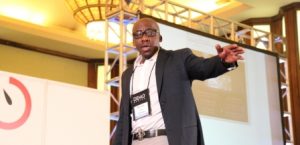
Modupe is a serial entrepreneur with an exceptional drive and passion towards problem-solving. A few years ago, Entrepreneur.com put out an article on the “7 Traits of Successful Entrepreneurs” which are Tenacity, Passion, Tolerance for Ambiguity, Vision, Self-belief, Flexibility, and Rule-breaking. Modupe embodies all seven characteristics. Having enjoyed a decade of success at Texas Instruments, he went on to found multiple companies that are now making a difference in the lives of many professionals across North America and Africa.
I caught up with Modupe while he was visiting Silicon Valley to engage Investors and Strategic Partners about his latest venture, Nigex (more info below). What excites me about the Nigex venture is the potential it has to uplift a generation of talented minds in Nigeria, and the rest of Africa.
1. Briefly describe your background- education, work experience, etc. 
Modupe is the founder and CEO of Nigex, a proprietary Agile Software Platform that enables resources from Africa to consult seamlessly for global jobs with the backings of a US company. Nigex developed agreements and tools that both consultants and clients can use to facilitate secure vetting, training, managing, and holding resources accountable. Nigex is a cost-effective way to outsource Software Development work without the typical issues of language barriers or requirement miss-alignment.
Modupe is also the co-founder of the award-winning technology and company called OTGPlaya. OTGPlaya connects end-users to digital content by leapfrogging existing bandwidth constraints of internet infrastructure. Since its founding in Austin, Texas, OTGPlaya has won the USAID Africa Diaspora Marketplace Award in 2012 and the 2013 LLGA City Pilot for City-Wide Wi-Fi in Lagos, Nigeria.
Modupe is also the founder of Vision Invent Inc (VI), a leading Design House and technology rep firm in the USA that supports hundreds of Original Equipment Manufacturing (OEM) customers.
Before forming VI in 2008, Modupe blazed his path successfully at Texas Instruments (TI) and served in several leadership roles. Modupe studied Electrical Engineering at Texas A&M University.
2. Flashback and then fast forward to the present, what has surprised you the most about your journey thus far? What advice do you have for others looking to take a similar path?
One could say I wasn’t such a risk taker, but when I found that my job at TI was never going to satisfy my desire to solve problems I cared to solve, I knew it was time to hire myself. So my advice here is to take your ambitions more seriously than anyone’s belief or disbelief in you.
My career at TI grew based on my ability to solve problems which made my job and those around me easier. I remember creating a tool for the Technical Team to use in isolating the right processor for a target client requirements by using a drill down signal chain block diagram system. Management found out about the tool and gave me my first promotion. The advice here is to not complain about what limits you, but find ways to solve and test your assumptions on the solution as opposed to looking to get credit for your unproven ideas.
Entrepreneurship is first about solving problems, but I was surprised to find that it is not sustainable without the right partnerships or resources. I learned this over the years of winning and losing business because of my inexperience with managing expectations. To fix this, I had to give shares of my company away to those who specialized in building a company and team; and before I knew it, everything I did began growing instead of shrinking. The advice here is not to become a jack of all trades and master of none. Master what makes you unique and comes easily to you while surrounding yourself with complementing partners that have measurable track records of success. In picking partners, focus on strengths and ensure you set goals, so everyone knows what to do and when. If a partner misses a goal, you should quickly evaluate the partner’s position and keep or vote them out based on their ability to meet the agreed upon goals.
3. Why is the cause you are pursuing or problem you are solving the most important for this generation? How would future generations benefit if it’s successful? What is at risk if you do not succeed?
The power to enable smart African kids is of significant value to me from a business and personal standpoint. I also believe technology is the great equalizer that can help young Africans circumvent government bureaucracy and transcend the corruptible reputation of Africans globally.
The Government and African leaders have yet to realize the goldmine of human brain resources they have, so why not me is what I asked. This realization is why I have decided to invest in the great minds and ensure a paradigm shift based on results and not just words. People tend to believe in what works which is why it is important to prove that a global job market will best serve our young minds.
4. Reflect on all of the key sacrifices and trade-offs you’ve had to make to get to where you are today. Which of these would you say was the most pivotal and why?
My realization about sacrifice is to prepare to lose it all before gaining what you seek. I had to sell my house and shed many cost centers that would have caused me to look back when I became an entrepreneur. You need to believe that you have what it takes to do more than what you have in your possessions, and rid yourself of any potential distractions.
5. What is the best piece of actionable advice you’ve received that continues to be a source of inspiration in good times and challenging times?
My friend, dad, and mentor, Alade Ajibola shared this with me “Success is a journey and not a destination, so chase your dreams only if the process is fun and rewarding.”
